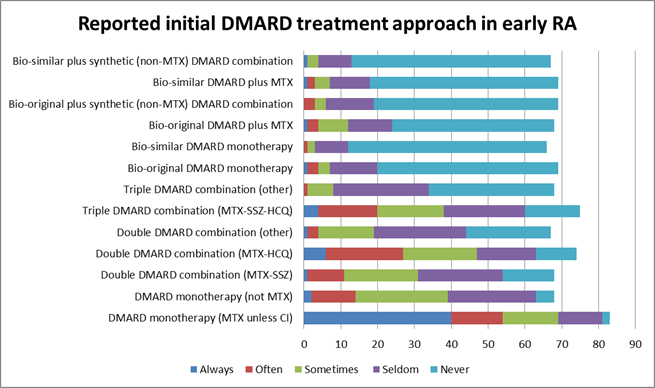Session Information
Date: Monday, November 9, 2015
Session Type: ACR Poster Session B
Session Time: 9:00AM-11:00AM
Background/Purpose:
Early diagnosis & treatment are crucial to the management of rheumatoid arthritis (RA). Despite this, the approach to early RA management appears to be inharmonious across countries, although this has not been systematically evaluated.
Methods:
An online survey was emailed to practising rheumatologists in all QUEST-RA countries & also made accessible on social media platforms between April & May 2015. Questions (n=38) assessed the structure & setting of early RA clinics, times to diagnosis & treatment, patient monitoring, use of guidelines & data recording.
Results:
Participants: 212 from 39 countries (76% European). 62% had an early RA clinic based at a university hospital. Patient referral to rheumatology was mainly (78%) via primary care. 44% had an agreed early RA local referral pathway, 15% a national pathway; 27% no pathway. 71% reviewed early RA patients in general rheumatology clinics. Only 16% had dedicated clinics, 76% of which were practitioners in European countries (64% northern Europe) who had access to local or national referral pathways. 42% collected patient data for research purposes. Over 50% reported patients being seen within 4 weeks from primary care referral, a third within 2 weeks. DMARD initiation at first review & within 4 weeks was reported by 47% & 31% respectively. The rheumatologists’ satisfaction levels significantly differed by clinic appointment duration (P=.005) satisfaction increasing with longer duration. 43% had radiographs of the hands & feet available at the patient’s first review. MSK US was ‘always’ provided on site by a rheumatologist (18%) or when considered necessary (37%). Over 50% reported having ESR/CRP & antibody results available at the first patient visit. Guidelines were followed by the majority of rheumatologists, especially European (P<=.001). Treatment decisions were reported to be influenced by international &/or national guidelines in 71% & 61%. Figure 1 shows the initial treatment strategies used. Steroid use was reported as ‘always’/’often’ per os by 26/24% & intra-articularly by 2/11%.
Conclusion:
These data are the first to provide comparative benchmark information regarding the global provision of early RA care. Substantial variations exist in referral & early assessment pathways. Guidelines play a key role, although their impact is most apparent in Northern Europe. This survey is the first of its kind providing invaluable insights that could help harmonize early RA management across countries.
To cite this abstract in AMA style:
Nikiphorou E, Galloway J, van Riel PL, Östör A, Haugeberg G, Gogus F, Kauppi M, Yazici Y, Sokka-Isler T. The Spectrum of Early RA Practice Across the Globe: Results from a Multinational Cross Sectional Survey [abstract]. Arthritis Rheumatol. 2015; 67 (suppl 10). https://acrabstracts.org/abstract/the-spectrum-of-early-ra-practice-across-the-globe-results-from-a-multinational-cross-sectional-survey/. Accessed .« Back to 2015 ACR/ARHP Annual Meeting
ACR Meeting Abstracts - https://acrabstracts.org/abstract/the-spectrum-of-early-ra-practice-across-the-globe-results-from-a-multinational-cross-sectional-survey/

